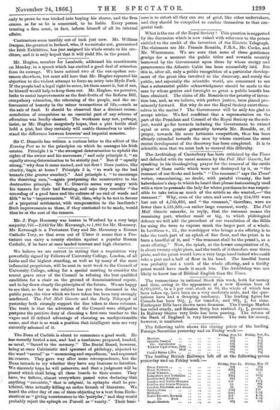What is the use of the Royal Society ? This
question is suggested by the discussion which is now raised with reference to the person entitled to the credit of the invention of the Electric Telegraph. The claimants are Mr. Francis Ronalds, F.R.S., Mr. Cooke, and Mr. Wheatstone. We are sure that none of these gentlemen grudge for a moment the public titles and rewards recently bestowed by the Government upon those by whose energy and perseverance the Atlantic Cable has been successfully laid. But this is, after all, only a public recognition of a particular develop- ment of the great idea involved in the discovery, and surely the public, and especially the scientific world, are concerned to see that a substantial public acknowledgment should be made to the man by whose genius and foresight so great a. public benefit has been obtained. The claim of Mr. Ronalds to the priority of inven- tion has, and, as we believe, with perfect justice, been placed pro- minently forward. But 'why do not the Royal Society exert them- selves in the matter ? The Government will be only too glad to accept advice. We feel confident that a representation on the part of the President and Connell of the Royal Society on the sub- ject, would go far towards inducing the Government to 'extend equal or even greater geheroslty towards 'Mr. Ronalds, or, if proper, towards his more fortunate competitors, than has been already extended towards the Men by whose ettertions the moat recent development of the diaccriery- has been coMpleted. It is to Scientific men that we must look to unravel this Aiflictilty.






























 Previous page
Previous page